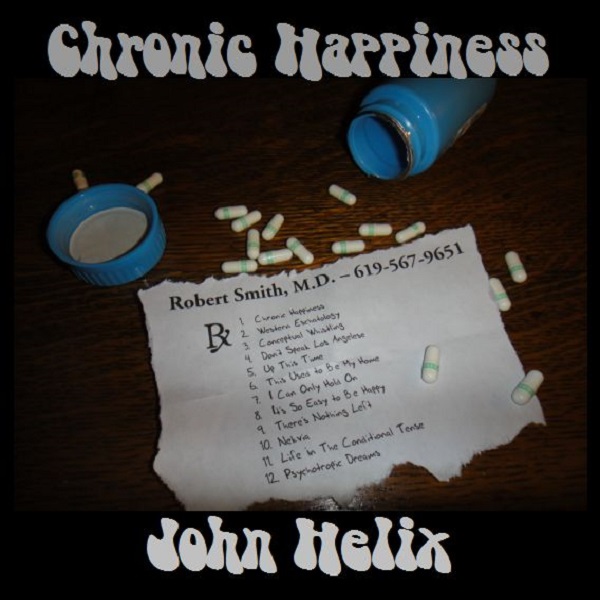When an English professor puts together an album, one can expect some interesting twists and turns, as well as more depth than meets the eye (or perhaps in this case, the ear). John Helix’s Chronic Happiness has that. Set to be released in March, Helix writes retro-tinged pop rock he describes as “weltschmerz”, German for “romantic sadness”. He claims the late great Elliott Smith as a primary influence.
The opener, “Chronic Happiness”, is a call to seek just that. The stark beginning features only a piano accompanying his vocals, sounding like a beacon of hope in a dark sea of despair. The slow build-up of instruments, one layer at a time, is akin to beauty slowly emerging. The melody ebbs and flows until the track reaches its surprisingly soft ending, as if a reminder that despite being worth it, the work to becoming happy is a hard one indeed.
The piano-and-vocals-only “Western Eschatology” is at first a surprisingly melancholic follow-up, but one only needs to listen to the lyrics to realise that perhaps this song could be taken as the first step, which is often the most difficult one, that Helix is taking in his journey. The piano makes way for a guitar in “Conceptual Whistling”, another moody song that seems to mark the second step towards building a pattern of thought and behaviour that would bring around the state of mind Helix is seeking to reach.
A small glimmering of optimism bubbles through in the piano-driven, sweet, catchy, and upbeat “I Don’t Speak Los Angelese” that is snuffed out in the guitar work on “Up This Time”, “This Used to Be My Home”, and “I Can Only Hold On”. These tracks hold distinctive country flavours and, despite their overall despondency, build on the process of achieving happiness by addressing more issues and obstacles.
Hope shines through in “It’s Hard to Be Sad” both lyrically and through the judiciously placed triangle that provides a sharp, cheerful note amidst the somewhat somber music. While the title “There’s Nothing Left” indicates that the light is once again hidden behind clouds, the upbeat guitars and higher vocal work lend it a sense of hope. “Nekuia” channels – through the simple, repetitive, piano runs and the haunting, wordless vocalisations – the definition of the word in ancient Greek: a ritual by which ghosts are called upon and questioned about the future.
The penultimate and short “Life in the Conditional Tense” is the shy and tentative return of the light, as if the news shared during the nekuia suddenly dispelled all of the previous melancholy. The light finally shines full force in the down-to-earth, piano-driven, more cheerful closing track, “Psychotropic Dreams”, which starts with, “Everything is not possible/But it doesn’t mean you shouldn’t try”, seemingly answering the question of how to develop chronic happiness through a life of optimistic effort.
More information about John Helix is available on his Facebook page, and one of the songs on the album is currently available for streaming on SoundCloud.
Pictures provided by Working Brilliantly.
First published on Blogcritics.

